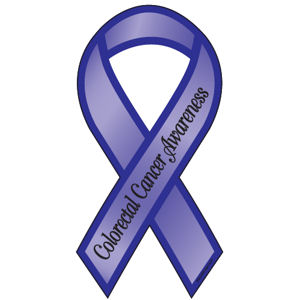(ThyBlackMan.com) March is Colorectal Cancer Awareness Month. Despite declines in rates of new cases and deaths from colorectal cancer in the African American community, this cancer is still the third leading cause of death.
Death rates from colorectal cancer are about 30 percent higher in African Americans than in whites and are more than twice as high as rates in Asian/Pacific Islanders, American Indians and Hispanics. But astoundingly,  60 percent of those deaths are avoidable with regular screenings.
60 percent of those deaths are avoidable with regular screenings.
“Colorectal cancer is one of only a few cancers that can be prevented through screening,” said Al Stabilito of the American Cancer Society. “Precancerous polyps, from which colon cancers often develop, can be identified and removed before they become cancerous.”
What is Colorectal Cancer?
The colon is the large intestine, or large bowel, and the rectum is the passageway that connects the colon to the anus. Colorectal cancer is the term used to refer to cancer that develops in the colon and/or rectum. It is also called colon cancer.
Why Are African Americans At Such A Higher Risk?
In general, there is a tremendous cancer disparity in the black community. With colorectal cancer,
it’s unclear why these differences exist, but access to and attitudes toward prevention and treatment may offer some explanation.
Several studies have found that African American patients are more likely to be diagnosed after the cancer has spread beyond the colon, making it more difficult to treat successfully. Another study found that African Americans were half as likely as Caucasians to have undergone colonoscopy screening, even after accounting for differences in education, income, and health insurance status. In addition, African Americans with colorectal cancer are less likely than Caucasian patients to receive recommended surgical treatment and therapies.
Like many other types of cancer, a family history of the disease and a diet high in red or processed meat is known to increase risk as well. Also, studies have indicated that men and women who are overweight (a serious ongoing issue in the Black community) are more likely to develop and die from colon cancer.
What Are the Symptoms?
Colorectal cancer can develop unnoticeably over years. When signs are noticeable, they can include:
• Blood in or on the stool (either bright red or very dark in color)
• A persistent change in normal bowel habits such as diarrhea, constipation or both for
for no apparent reason
• Stools that are narrower than usual
• General stomach discomfort (bloating, fullness and/or cramps)
• Frequent gas pains
• A strong and continuing need to move your bowels, but with little stool
• A feeling that the bowel does not empty completely
• Constant tiredness Stomach pain, aches, or cramps that do not go away.
• Unexplainable weight loss.
When Should I Get Tested?
While the standard recommended age for people of average risk to begin screening is 50, doctors recommend that African American men and women, due to their increased risk, begin screening at age 40. This change was prompted after the American College of Gastroenterology issued new recommendations to healthcare providers to begin colorectal cancer screening in African Americans at age 4o because of the prevalence of them being diagnosed at younger ages than Caucasians.
What Will Happen During A Screening?
Colorectal cancer usually starts from polyps in the colon or rectum. A polyp is a growth that shouldn’t be there. Colorectal polyps generally do not become cancerous for about a decade. According to Deborah Kirkland, manager of the colorectal cancer division for the ACS, about one in seven polyps develops into cancer – so the sooner those polyps are removed, the less chance an individual will develop cancer.
Screening tests can find polyps so they can be removed. Screening tests also can find colorectal cancer early. While everyone should talk to their doctor about the appropriate screening test and schedule for them, general screening methods include a fecal occult blood test (FOBT), flexible sigmoidoscopy, colonoscopy and a barium enema with air contrast and virtual colonoscopy.
“Colorectal cancer is a preventable disease through detection of precancerous polyps, better diet and a generally healthier lifestyle,” Kirkland says.
Written By Charlotte Evans

















I wrote my countertop argument in your Colorectal Cancer:
Why Is It Still Such A Threat? : ThyBlackMan.
com over inside my website in the event you go here, http://Www.
Garciniacambogiaextract.us.